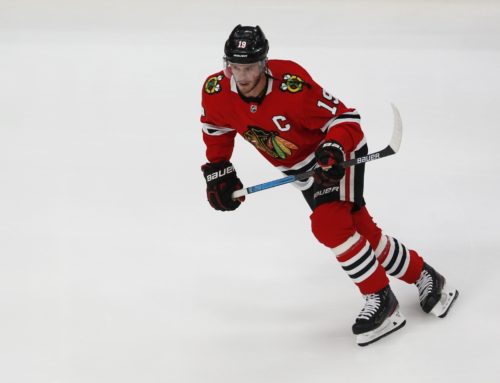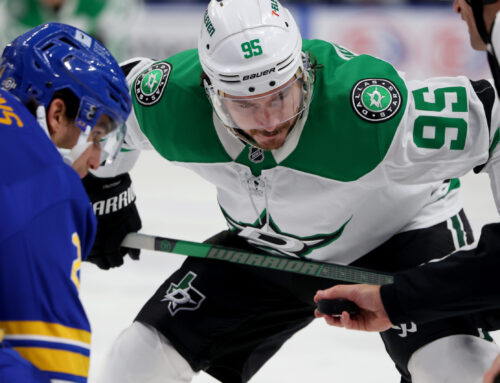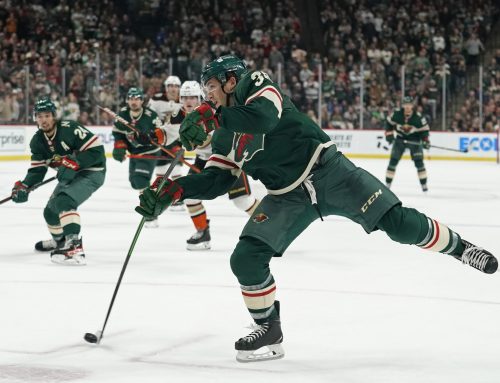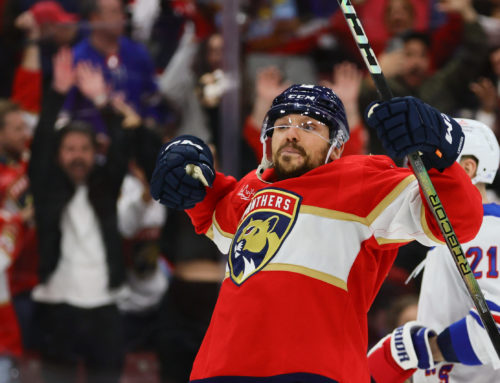The first NHL game I attended was between the Montreal Canadiens and Toronto Maple Leafs. Carey Price has always been my favourite player, so 10-year-old me was absolutely ecstatic to see him play live. I'll never forget the feeling of disappointment I experienced after finding my seat and seeing Alex Auld in net for the Habs (no disrespect to Alex Auld). I mention this story to show you that I can relate to your current emotions: You clicked on this article expecting fantasy analysis and words of wisdom from Dobber himself, but instead, you're stuck with me.
Now, Alex Auld ended up winning that game* for the Habs, so my disappointment ultimately turned to elation – hopefully you can say the same after reading these Ramblings!
*He didn't actually win that game
After a hectic few days of trades and free agent signings, Sunday was a quiet day in the NHL. Without any new moves to break down, I thought I'd share a couple of my fantasy hockey philosophies to hopefully challenge the way you think about our favourite game.
*
Injuries
Over the past few years, I've had the pleasure of providing injury updates here at Dobber Hockey. I think the experience has provided me with unique insight into how injuries should affect a player's fantasy hockey value. Initially, I believed that injury history was an integral component of player evaluation. I had a misguided mindset that if a player missed games in the past, they were more likely to miss games in the future. However, my opinion on the topic has evolved over time, as I came to realize that I was oversimplifying a complex situation. When factoring injuries into a player's fantasy hockey value, it's extremely important to consider context.
For example, let's look at Anthony Mantha. At first glance, you'll see that he missed 28 games last season, 15 games the year before that, and 22 games during the 2016-2017 campaign. Missing significant time in three of four seasons seems like cause for concern; he appears injury-prone and you may want to steer clear of him in fantasy formats. However, a closer look provides a lot more context and may change your perspective.
In 2016-2017, Mantha's stats show that he played 60 NHL games. Since we know a typical regular season consists of 82 games, it's instinctive to think that he missed 22 games with injuries. In reality, Mantha wasn't with the Red Wings for the first 15 games of that season, as he was playing in the AHL. So, he only missed the final few games of that year with a fractured finger – which he suffered in a fight.
During the 2018-2019 campaign, Mantha suffered a hand injury after fighting Patrick Nemeth and was sidelined for 15 games.
Oh okay, so maybe Mantha likes to fight a lot. Which means he's at risk for more fight-related injuries, right? Well, not quite. Although Mantha fought five times during his rookie season (when he fractured his finger), he's only been in four fights in three seasons since. One might say that the injuries altered his play style and shifted his focus from fighting to scoring.
Finally, we arrive at last season, when Mantha missed a whopping 28 games due to injury. Given his history up until this point, I think it's important to mention that Mantha did not fight a single time during the 2019-2020 campaign. Instead, he missed eight games with a knee injury that he suffered during a knee-on-knee collision and 20 games with a punctured lung – courtesy of a Jake Muzzin takedown.
While the fractured finger and hand injury may be attributed to his 'fighting tendency', the knee injury was completely unrelated. So, I think it's misleading to lump all those injuries together and label Mantha as injury-prone.
Then there's the punctured lung, which you can argue came from Mantha's instinct to protect his teammates – and relates to his willingness to drop the gloves. However, the play leading up to Mantha's punctured lung occurs so frequently in the NHL and rarely does it end the way it did. We often see players crosscheck their opponent and engage in a physical/verbal battle following a hit like that. However, takedowns of the variety that Muzzin dished on Mantha aren't exactly commonplace in today's NHL – especially considering the routine interaction that preceded it. So, I have a hard time believing that the injury came as a direct result of Mantha's playstyle and behaviour on that particular play.
If you allowed Mantha's injury history to weigh down his fantasy value, you'd miss out on a rising star that has consistently improved his point production over the last few years. He paced for 49 points during 2017-2018 campaign, 59 points in 18-19, and 72 points last season. Injuries have prevented Mantha from actually achieving the lofty point totals he's been on pace for. However, that just means you're getting a discount on a really good player, because odds are, he'll be drafted much later than he should be in your fantasy league.
With all this incoherent babble, I'm trying to say that missing games due to injury in the past, shouldn't automatically diminish a player's future fantasy hockey value. The story is usually much more complex and it's worth judging each case individually, rather than using a generalized approach. In Mantha's case, I don't think his early fight-related injuries are as relevant today, because his playstyle has evolved significantly over the last few years. That leaves just the knee injury and punctured lung, which I see as two isolated events that were caused by the random, fast-paced nature of hockey.
*
To expand on this idea of injuries being unrelated, isolated, random events, I thought I'd suggest an analogy. If you injured your leg last year in a car accident and you sprained your wrist this year after slipping on a sheet of ice, would your past injuries increase the likelihood of suffering a serious injury next year? Probably not. Hockey is such a fast-paced sport of randomness; anything can happen at any given time. A completely bizarre and unlikely sequence of events can result in a player being injured through no fault of their own.
Of course, there are probably some cases where certain players are more prone to injury due to their biological makeup or fitness – but as fans I don't think we have all the information to make those judgements.
With that being said, we should exercise a bit more caution when a player has suffered the exact same injury multiple times and their on-ice ability has declined as a result of that injury (i.e. Bobby Ryan's hand injuries).
In summary, if you're going to avoid a player because they're injury-prone, make sure you have strong evidence to support that belief. Playing less than 82 games consistently is not the only prerequisite for the title of 'band-aid boy'. Oftentimes, people place too much weight on injury history and end up undervaluing high-end assets. Don't be one of those people!
*
Mainstream Media Coverage
In the same way that injuries can drop a player's fantasy stock below fair value, media coverage can boost a player's fantasy stock above fair value.
A lot of people mistakenly believe they're immune to advertising, because they don't realize the true purpose of an ad. Companies don't necessarily want you to buy their product or use their service immediately after watching a commercial – they want you to become familiar with their product or service, so it's the first one that comes to mind when you eventually need that product or service. I don't currently have a pressing need to buy batteries, but when I do, I'd probably go with Duracell or Energizer because I've seen their brands on TV before.
The same logic can loosely be applied to the world of fantasy hockey. When a player is in the news for contract negotiations or trade rumours, we usually get bombarded with media coverage related to that player. If a player's name is constantly in the news, then you're subconsciously growing more familiar with that player compared to others. So, if you haven't thoroughly planned every round of your fantasy draft, you may default to these players when you're running out of time to make a selection and have to rely on instinct. This seems like a useless thought, but it taught me to plan my drafts more thoroughly as I realized many of my instinctive selections were influenced by media coverage.
Media coverage also ensures everyone knows everything about players in the news cycle. So, when Taylor Hall signs in Buffalo and 15 different outlets explain how he and Jack Eichel are bound to create magic together, Hall's perceived fantasy hockey value skyrockets. In these situations, there's no longer a favourable discrepancy between perceived value and actual value. It becomes impossible to buy these players below market value, so it's no longer worthwhile to target them in your fantasy draft. Let's look at Hall again. Over the past six seasons, only twice has he been on pace for 90 or more points – pacing for 60 points in those remaining four years. Yet, because of the hype surrounding his signing in Buffalo where he gets to play beside Eichel, he's going to be drafted in the first few rounds of your fantasy draft – as if he were a perennial 90-point player. Essentially, you'd need Hall to perform at his very best in order for you to break even on the draft pick you spent to acquire him – leaving way too much room for disappointment. While there are certainly examples of newly-signed free agents that remain underrated in fantasy formats, I think hype from media coverage overinflates a player's value in most cases.
Let me know your fantasy hockey philosophies in the comments! Thanks for reading.





 SEA
SEA NYI
NYI BUF
BUF DAL
DAL
 CBJ
CBJ NYR
NYR ANA
ANA STL
STL L.A
L.A OTT
OTT
